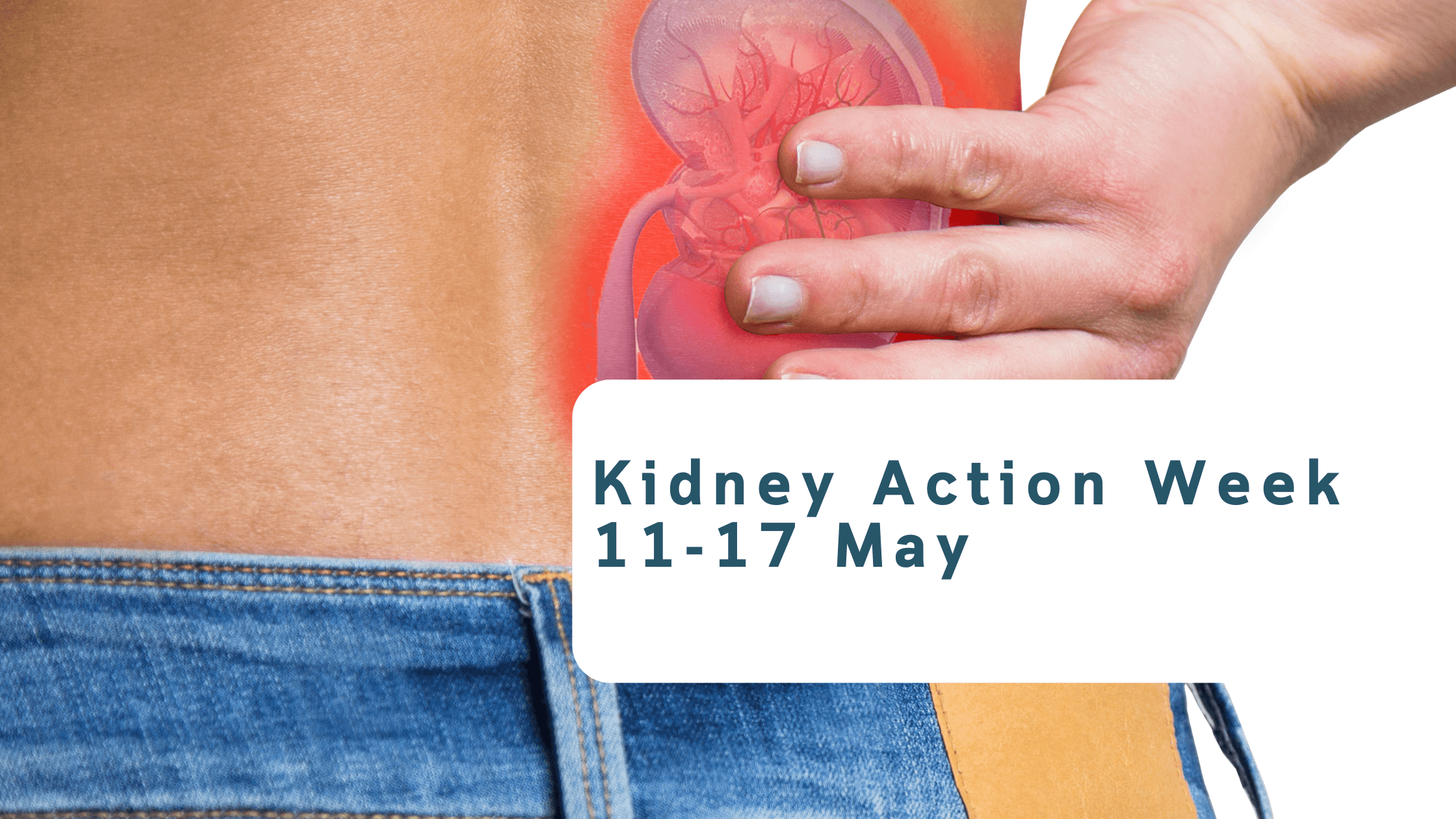Kidney Action Week
11-17 May
Did you know?
‘Waiting for symptoms appear is too late – you can lose 90% of kidney function without experiencing any symptoms.’ - Kidney Health Australia
How many Australians have chronic kidney disease (CKD)?
01 - Approximately 1.7 millions Australian adults have CKD indicators. (1)
02 - Less than 10% of the people with CKD are aware they have this condition. (2)
03 - This means over 1.5 million Australians are unaware they have indicators of CKD.
04 - For every Australian receiving renal replacement therapy due to diabetes, at least 50 others have earlier stages of diabetic kidney disease (DKD). Based on projected increases in type 2 diabetes prevalence, the size of this underlying population with DKD will potentially exceed half a million by 2025. (3)
The cost to the Australian health system
The best available evidence on cost per person per year on dialysis is:
- hospital haemodialysis - $79,072
- satellite haemodialysis - $65,315
- home haemodialysis - $49,137
- peritoneal dialysis - $53,112 (4)
In 2020–21, an estimated 1.2% of total allocated expenditure in the Australian health system ($1.9 billion) was attributed to chronic kidney disease (AIHW 2023).
The average health system spending per case of CKD in 2018–19 was $2,326 (males $3,012, females $1,727) (AIHW 2022). (5)
What is the function of our kidneys?
Our kidneys play a major role in our body:
01 - 'Clean your blood and circulate a fresh supply around your body 12 times every hour.
This works out to a total of around 200 litres of blood per day.
02 - Process excess fluid and unwanted chemicals and waste in your blood.
The result is about one to two litres of urine that you pass each day, detoxifying your body.
03 - Keep your blood pressure regular by telling the blood vessels in your body when to expand and contract.
04 - Manage your body’s production of Vitamin D, which is crucial for maintaining strong bones and producing red blood cells that carry oxygen around your body.' - Kidney Health Australia
To have a better understanding about our kidneys, watch this video from Kidney Health Australia below, explaining what our kidneys do, and what puts us at risk of kidney disease and how to keep your kidneys healthy.
Who is at increased risk of developing kidney disease?
Here are some factors that increase the risk of developing kidney disease: -
diabetes
high blood pressure (also known as hypertension)
established cardiovascular disease, including heart attack, heart failure and stroke
family members with kidney failure
overweight and obesity.
smoke cigarettes
over 60 years old
acute kidney injury earlier in like
Is there anything we can to do manage our kidney health?
5 Ways you can manage your kidney heath
01 - Exercise
Exercise has many benefits, you can read more about that here.
How exercise can help with kidney disease?
Studies have found that exercise:
01 - Reduces diabetes risk & improves glucose control in diabetics
02 - Reduces anxiety & depression
03 - Decreases blood pressure
04 - Improves health related quality of life
05 - Increases exercise capacity
06 - Increases muscle mass
07 - Increases strength
08 - Aids weight loss & managing body weight
Note:
For chronic kidney disease (CKD) patients, exercise prescription should adhere to training principles such as individualisation, specificity, adaptation, recovery, reversibility, and overload.
Exercise load, determined by the frequency, intensity, and duration of exercise, is essential to consider when prescribing an exercise regimen.
Here are some tips to get moving:
- Break up your 30 minutes into three shorter sessions if you're short on time.
- Walk more by getting off the bus a couple of stops early or walking to the shops instead of driving.
- Take the stairs instead of the lift or escalator. Or walk the travelator.
- Do activities you enjoy.
- Exercise with a friend or join a group for extra fun and motivation
- Daily tasks like mowing the lawn or walking around the shops count too.
02 - Quit smoking
Quitting smoking is the best thing you can do to lower your risk of kidney disease.
Smokers are 3x more likely to have kidney issues and have a higher chance of heart problems too.
Here's how you can quit:
Call Quitline on 13 7848 or ask your local health center about stop smoking programs.
Hang out with non-smokers whenever possible
Talk to your doctor can really help you quit for good
Find healthy activities to replace smoking, like walking, sports, Pilates or yoga.
03 - Maintain a healthy weight
Keeping a healthy weight is crucial.
- Eat a variety of nutritious foods and watch your portion sizes.
- Aim for a BMI between 20 and 25 to reduce your risk of kidney disease, diabetes, and high blood pressure
.
Healthy eating tips from Kidney Health Australia include
:
- Eating plenty of fruits, veggies, legumes, and whole grains
.
- Having lean meats like chicken and fish regularly
.
- Cutting back on snacks high in fat, sugar, or salt.
- Limiting takeaways and fast food to occasional treats.
- Adding flavor to meals with herbs and spices instead of salt
.
- Get advice from your doctor or a dietitian for personalised nutrition.
04 - Limit alcohol intake
Too much alcohol can harm your heart and raise your risk of kidney issues.
Try these tips from Kidney Health Australia:
- Ask for ice with your drinks to dilute the alcohol.
- Have a glass of water after each alcoholic drink.
05 - Stay hydrated
Staying hydrated keeps your whole body, including your kidneys, healthy. Water is the best choice.
Here's how to drink more water:
- Add fruit slices for a tasty twist.
- Keep water nearby or carry a bottle with you.
- Limit sugary drinks like cola, as they can harm your kidneys, blood pressure, and lead to diabetes
.
https://kidney.org.au/your-kidneys/know-your-kidneys/keeping-your-kidneys-healthy
https://bit.ly/4bz8JkW
Did you know?
‘3 in 4 Australians are at risk of developing kidney disease.’ - Kidney Health Australia
You should have a Kidney Health Check once a year if you:
- Have diabetes
- Have high blood pressure
- Are First Nations Australian aged 18 years and over
You should have a Kidney Health Check every two years if you:
- Are a current or former smoker
- Are very overweight or obese
- Had a stroke, heart attack or have heart failure
- Have a family history of kidney failure, dialysis or kidney transplant
- Have a history of acute kidney injury
- Are over 60 years of age
It is also important to note people who have none of the risk factors above may also develop kidney disease. You can take the Kidney Risk Test, click here. - Kidney Health Australia
Reference
(1) Australian Bureau of Statistics. Australian Health Survey: Biomedical Results for Chronic Diseases, 2011-12. ABS, Canberra; 2013.
(2) Australian Bureau of Statistics. Australian health survey: First results 2011-12. 2012. Report No.: 4364.0.55.001.
(3) Diabetic kidney disease in Australia: current burden and future projections https://bit.ly/3wzbTpW
(4) Kidney Fast Facts https://assets.kidney.org.au/images/kidney-fast-facts-fact-sheet.pdf
(5) Chronic kidney disease: Australian facts https://bit.ly/4byJwqM







